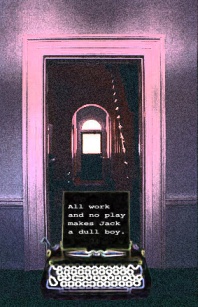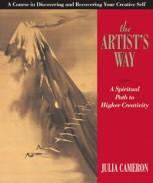Filling the Well -or- The Care and Feeding of Your Muse
Part Three of a three-part series on helping creativity flow

All three legs
You can only stare at your computer screen or scribble words on a page for so long before you start to go wacky. Ask Stephen King. Or his character, Jack Torrance.

Don’t let it get this bad, fellow writers!
There are a bunch of ways to fill the well/care for your muse (pick your metaphor). Julia Cameron, whose book, The Artist’s Way, was mentioned in the first post of this series, recommends Artist Dates. For an artist date, you set aside maybe an hour a week to do something fun, but you need to do it by yourself. No significant other, no kids, no pals. You explore some new, interesting thing without having to worry about what anyone thinks of you, or of the experience. It’s a great idea. It’s also more difficult than it sounds. It’s not usually hard to participate in your Artist Date once you get there. What’s difficult is committing to take the time to do it. It’s easier, as Cameron says, for most of us to work at our art than it is to play at it. I’m not that good at it myself, but I have actually tried this in the past. Some of my artist dates have included:
- Sitting in a bookstore and looking at gorgeous art or travel books
- Going to Naper Settlement, a local living history museum
- Pulling out a kid’s set of watercolors and painting, even though I suck at it
- Bird watching
- Driving to Starved Rock State Park to hike and take photos
- People-watching at Union Station while jotting notes about people and my surroundings
The Union Station trip was a particularly good idea. It was a week or so into NaNoWriMo, and I was hating every word I’d written. I couldn’t face the page anymore. After a few hours of writing about something other than my novel – something no one was going to read – I came back refreshed and ready to write on my novel again. It was like magic.
You don’t need to fill the well all by yourself. Hanging out with other, like-minded people can be energizing, too. There’s no way I would have stayed as committed to writing if I hadn’t found my writing group, The Journey. We support each other as a group. In addition to working on our craft together and commiserating, we also find ways to have fun. Various activities have included visiting The Art Institute or Morton Arboretum, seeing live theatre, starting our own reader’s theatre group to read Shakespeare plays together, learning archery, going out for drinks, and playing games. And when possible, we try to find ways to organize a potluck lunch or go out to dinner.
So there are at least two ways to go – solitary or social. I recommend both. If you haven’t already started a muse-feeding, well-filling practice, try the one that’s easier to manage, and try to do it at least once a week if you possibly can.



